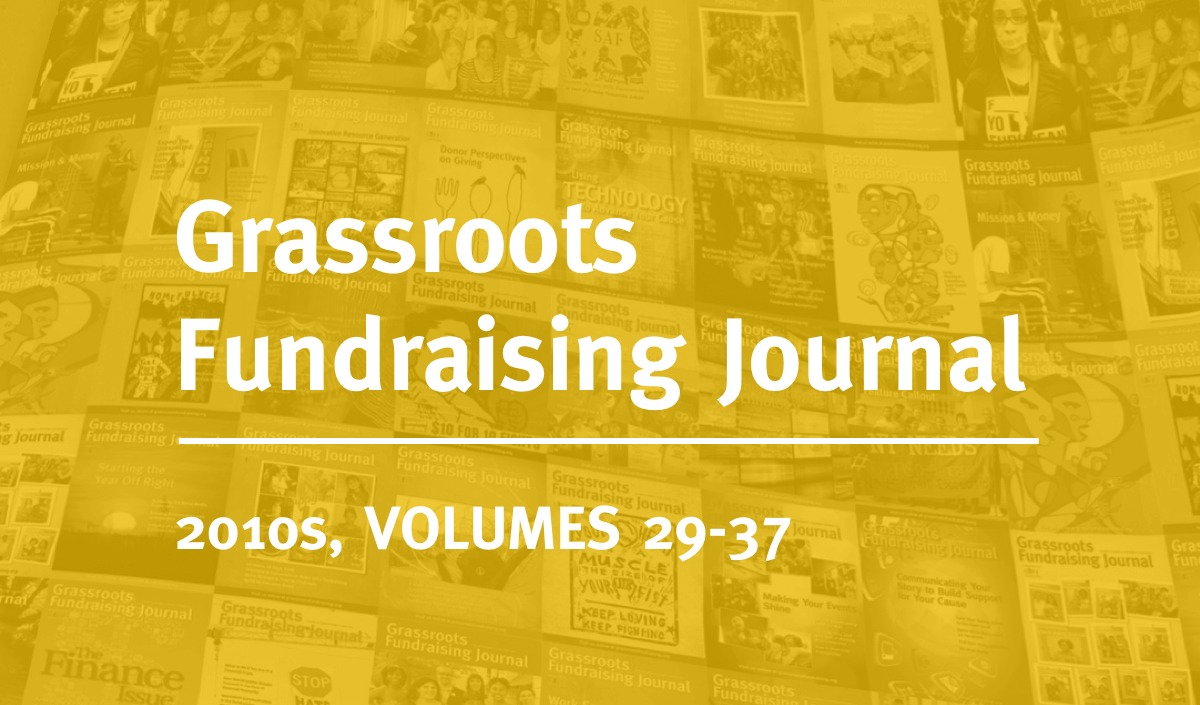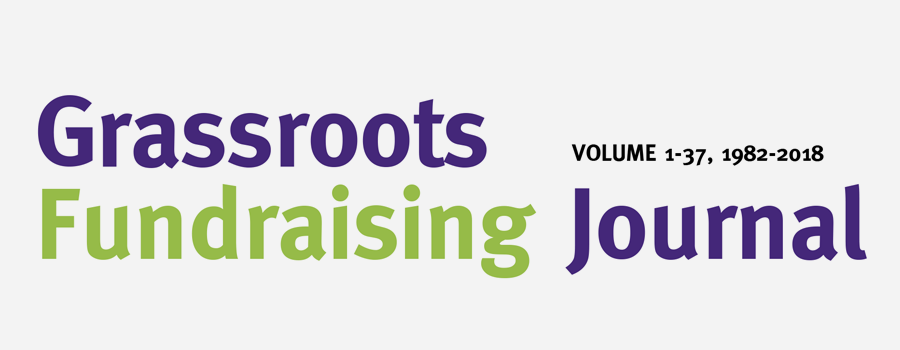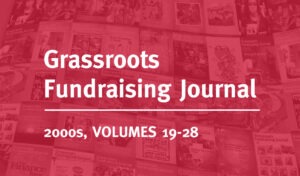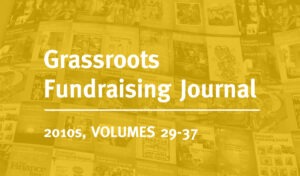
Editors’ note: This article, first published in print during July/Aug 2011, has been republished for Nonprofit Quarterly with minor updates.
WHEN I HEARD THAT THE THEME for this issue would be “Working Smarter, Not Harder” my ears perked up. As the mom of an adorable four-year-old and someone who manages a chronic health condition, I am careful not to let my work take over my life. I stayed at my last job for almost eight years, and I intend to stay at this one for a good long while—and at only 80 percent time.
I don’t believe that martyrdom is an effective leadership strategy. That means I set limits. I take breaks. And I don’t work nights or weekends unless I am on a work trip. That means I have to be realistic. I have to live with the fact that I will not get it all done. And I have to be creative about how to delegate without overburdening other staff I try to set up a clear expectation that they get to go home at 5:30, too.
But in a small organization I can’t farm the fundraising out to a development team. We have no development team. We are just a staff of fie, mostly part-timers, with a relatively small core of geographically spread donors and volunteers—not a broad membership base like many grassroots organizations have. How do we do it?
The Basics
Our organization, EcoViva, works in partnership and solidarity with low-income communities in Central America organized to achieve environmental sustainability, economic self-sufficiency, social justice, and peace. Our main focus area is the Lower Lempa region of El Salvador, where we provide funding, technical assistance, and alliance-building support to a social movement made up of about 100 rural communities working to protect the Bay of Jiquilisco Biosphere Reserve and create a vibrant green economy. We also provide limited funding to similar community organizations in Honduras and Panama.
Sign up for our free newsletters
Subscribe to NPQ's newsletters to have our top stories delivered directly to your inbox.
By signing up, you agree to our privacy policy and terms of use, and to receive messages from NPQ and our partners.
Our budget is just over $500,000 per year. Half of our income is from major donors, if you include the 50 percent or so of our foundation grants that come through trustees of family foundations that do not require any official proposals. About one-third of our income is from institutional foundations (the kind that require proposals and reports), and the rest comes from earned income and grassroots donations.
In 2010 our funds came from 12 institutions (10 foundations and 2 businesses) and 130 individuals (117 of whom gave less than $1,000). We submit approximately 20 letters of inquiry and proposals to prospective and current foundations per year, while we work to support and cultivate about 22 major donors ($1,000 and up) and 24 monthly donors from within our donor ranks.
We are all fundraisers
Without a dedicated fundraiser, we all take on fundraising roles. Generally, the programs director is our foundations person, the communications manager builds our grassroots donor base, and as executive director I’m our go-to gal for major donors in addition to coordinating the whole shebang. But every single person involved with the organization contributes to getting our donors excited about our work and keeping them engaged, not just as donors but as allies and friends. And that engagement is key to our strength.
We realize that donor engagement is much more than just the ask. Our donors are in many cases also our allies, advisors, task force members, and event organizers. If I try to calculate how much time our staff spend on fundraising, I can’t discount all of the ways we communicate and relate to donors and potential donors that builds their relationship with us—tabling at events, sending out newsletters, organizing board committees, making personal phone calls, writing mid-year reports, sending emails. I estimate that we each spend about 60 to 70 percent of our time engaging donors in some aspect of our work, sometimes just as donors but often also as allies whose engagement is greater than the money they give. And I feel that the more engaged they become, the stronger we will be.
The following list of the fundraising-related responsibilities of each person on the EcoViva team gives more detail on how we share the fundraising work. By integrating fundraising into our other organizational jobs, we use our fundraising to engage our donors in our work and build a stronger base to support our mission. I hope seeing how we share the fundraising function will help you think creatively about how your own team can work collectively to engage your donors and expand your base. If we can do it, so can you!
Fundraising-Related Responsibilities of the EcoViva Team
- Executive Director (ED) – 80% FTE Determine funding targets and create fundraising plan Maintain personal contact with major donors (give $1,000 or more annually) and loyal donors (have given at least $100 per year for at least three years or give monthly) Maintain personal contact with foundation trustees and staff
- Conceptualize and review communications materials and appeal
- Brainstorm strategy for each foundation approach Call/email foundation prospects (using language crafted by PPD)
- Write 25% of foundation proposals and letters of intent (LOIs)
- Edit other foundation proposals as needed Review and edit foundation reports
Draft print appeals and thank you letters Write personal notes on all thank you letters - Attend funding conferences
- Support board fundraising
- Follow up with tour participants to cement involvement in fundraising
- Type up relevant contact notes in Excel for entry into database
- Programs and Policy Director (PPD) – full time Identify funding needs on the ground
- Coordinate foundation prospect research, with help from interns
- Coordinate shared foundation calendar and research spreadsheet Craft email approaches to prospects (with ED input) Draft 75% of LOIs and foundation proposals, using the latest program information
- Write all foundation reports Conduct direct foundation approaches where appropriate
- Coordinate with potential partners and academic institutions for joint funding proposals
- Conceptualize and draft new proposals (with ED input) Build fundraising capacity of local partners Type up relevant contact notes in Excel for entry into database
Programs and Policy Director (PPD) – full time
- Identify funding needs on the ground Coordinate foundation prospect research, with help from interns
- Coordinate shared foundation calendar and research spreadsheet
- Craft email approaches to prospects (with ED input)
- Draft 75% of LOIs and foundation proposals, using the latest program information
- Write all foundation reports
- Conduct direct foundation approaches where appropriate
- Coordinate with potential partners and academic institutions for joint funding proposals
- Conceptualize and draft new proposals (with ED input)
- Build fundraising capacity of local partners
- Type up relevant contact notes in Excel for entry into database
Communications Manager (CM) – 20 hrs/wk
- Coordinate house parties and special events nationwide Find event sponsors and food donors
- Craft and send all eblasts, e-appeals and related social media posts Draft print communications materials and appeals as needed (with ED input)
- Establish and build relationships with online giving portals (Global Giving, First Giving, etc.)
- Gain entrée into employee giving campaigns (still in conceptual stages)
- Build individual donor prospect list by tabling at local events
- Type up relevant contact notes in Excel for entry into database
Tours logistics Coordinator (TlC) – 10 to 15 hrs/wk
- Recruit universities and congregations for Community Empowerment Tours (EcoViva income source)
- Gain fundraising commitments from Community Empowerment Tour participants while in El Salvador, communicate those to ED and CM
- Type up CET participant notes in Excel for entry into database
Operations Manager (oM) – 15 hrs/wk
- Ensure all donors receive timely thank you letters
- Coordinate and oversee all data entry
- Do data pulls and segmentation as needed for email and print appeals
Board/loyal donors
- Host house parties
- Provide prospect names
- Help spread the word about online giving campaigns Identify and approach potential event sponsors
- Identify potential Community Empowerment Tour leaders at universities and congregations
- Invite friends on Community Empowerment Tours to get to know our organization
interns/volunteers
- Carry out foundation research
- Help support and clean up data entry
- Help at house parties and special events
- Identify and approach potential event sponsors







